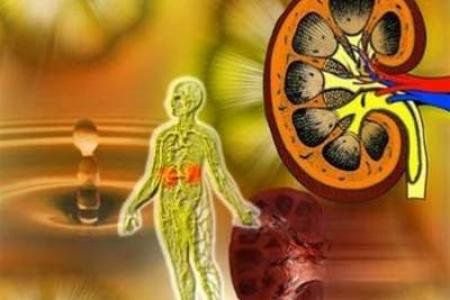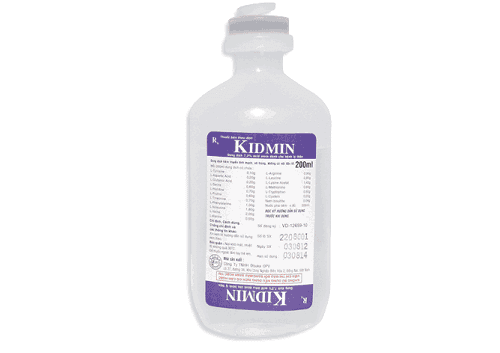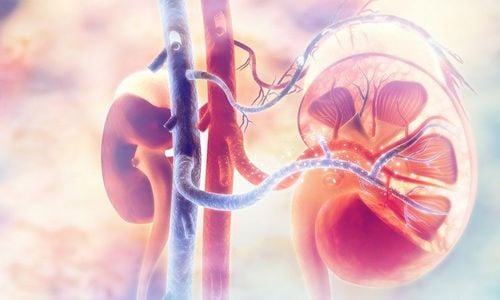This is an automatically translated article.
Acute kidney failure is a condition in which one or both kidneys in the body temporarily fail or lose function. At that time, the glomerular filtration rate is significantly reduced, causing uncomfortable symptoms for the patient such as hypertension, edema, disturbances in alkaline-acid balance or water electrolytes.1. What is oliguria?
In the kidney, the formation of urine consists of 2 processes:
1.1 Glomerular filtration Some of the plasma in the blood is filtered through the capillaries and then enters the Bowman's capsule and becomes the glomerular filtrate.
1.2 Tubular Reabsorption and Excretion The volume and composition of the filtrate is altered as it passes through the tubules. Some of the solutes are then excreted into the tubular fluid and into the urine. Besides, water and some other dissolved substances are brought back through the process of reabsorption.
The process of making urine not only helps the body get rid of harmful substances, but also helps retain water, electrolytes and other important substances. There are 3 factors related to urine output:

Quá trình lọc ở cầu thận
Prerenal factor: The glomerulus will work to filter urine normally when the blood volume and blood pressure in the renal artery are just right. Regardless of whether the increase or decrease in the above two factors will affect the glomerular filtration. Renal factors: The process of filtration and absorption in the kidneys directly affects the amount of urine produced. Filtration occurs normally when the blood pressure is large enough to push the plasma into the Bowman's capsule. Absorption occurs in the renal tubules. Therefore, the renal tubules must be in a normal state, in addition, this activity is also dependent on 2 hormones, aldosterone and ADH. Post-renal factor: After the process of filtering and absorbing urine, it will be excreted. Some causes affecting excretion obstruction can be tumors, kidney stones,.. Normally, the average urine output of each person is about 1000-1400 ml/24 hours depending on the amount. hydration, activity level, weight, and several other environmental factors. When urine output is less than 400ml/24 hours, it is called oliguria.
2. Causes of oliguria in people with acute renal failure

Viêm cầu thận cấp có thể gây ra thiểu niệu ở người suy thận cấp
In addition to physiological causes such as drinking less water, sweating a lot, diseases, especially acute nephritis, are the biggest factors causing oliguria. Some causes in the kidney can be mentioned as:
Acute glomerulonephritis: Acute glomerulonephritis can cause oliguria or even anuria. Manifestations of this disease are fever, fatigue, hematuria, edema, increased blood pressure, headache, nausea. Chronic glomerulonephritis can also cause oliguria Acute tubular necrosis: Oliguria is an early sign of this condition. Acute poisoning or shock can be the cause of the disease Interstitial nephritis: There are two main causes of interstitial nephritis, infection or the influence of some antibiotics and anti-inflammatory drugs. Renal vascular disease: Obstruction of the renal artery or vein on both sides, causing symptoms of pain in the hip, back, fever, etc. may also be the cause of oliguria.
3. Diagnosis of oliguria in people with acute renal failure
To diagnose oliguria in patients with acute renal failure, the doctor will combine the results of clinical examination and study the patient's living habits such as: time of onset of oliguria, amount of water intake, pain (if any). In addition, the patient will also be prescribed a urine test to analyze urine composition, color, pH, urinary tract infection, .. In addition to the above measures, abdominal ultrasound or CT scans are also prescribed. may be prescribed by doctors when diagnosing oliguria in patients with acute renal failure. These tests help find the cause of oliguria, acute kidney failure more accurately. Besides, while being diagnosed with oliguria, the patient should also inform the doctor about the medications they are taking, the history of kidney disease if any. Any questions that need to be answered by a specialist doctor as well as if you want to be examined and treated at Vinmec International General Hospital, you can contact Vinmec Health System nationwide or register online. online HERE.













